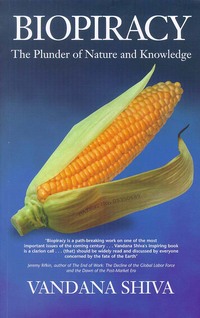Book Review: Biopiracy by Vandana Shiva
Posted: March 18, 2013 Filed under: Book reviews, Factory Farming & Big Ag, local/national/global, Policy, Race Issues | Tags: Biopiracy, Ecofemenism, GATT, Indigenous Knowledge, IPR, Patent Law, Vandana Shiva Leave a commentIn “Biopiracy: The Plunder of Nature and Knowledge” (1997), Vandana Shiva explores the exploitation of the Third World by the North (West). Major corporations have invaded native communities and environments for commercial interests. In referencing the shift from colonialism to more modern forms of oppression, Shiva writes, “the duty to incorporate savages into Christianity has been replaced by the duty to incorporate non-Western systems of knowledge into the reductionism of commercialized Western science and technology”.
Community knowledge of the intricately interwoven ecosystems of forests, crops, and livestock has for generations sustainably maintained local economies. Biopiracy refers to the theft of this knowledge by corporations seeking to patent indigenous crops, animals and methods of farming.
Vandana Shiva argues that in the return to sustainable practices, science and society have much to learn from indigenous practices and native populations. The rate at which resources are used has spiked only in the last two centuries as globalization and the rise of technology and industry increased production and waste. Our current overzealous habits represent a discord between man and nature as ecosystems are disrupted, species lost, and native communities exploited. Instead of man and woman cohabitating with nature, Shiva explains, we have come to view nature as something to be dominated. Because indigenous knowledge is inherently gendered, both nature and women have come to be dominated and exploited by man. In regarding indigenous knowledge and the work of women, western frameworks have systematically undervalued both systems and their contributions to modern networks.
The Indian view of nature and man, in contrast, presents “..a duality in unity”. In modern society, science and technology have become cognitively inseparable, creating a form of social control. Because science is seen as verifiable and objective, consequent uses of science and technology are rarely questioned. In order to remedy gender relations as they relate to science and technology, it is important not to vilify knowledge, which, although previous misused, may be helpful in a more egalitarian framework. Keeping in mind the past injustices suffered by native communities at the hands of European colonists, indigenous knowledge has survived many setbacks. Regardless, indigenous knowledge systems have contributed greatly to modern science, agriculture and medicine.
Biopiracy was a great book. Vandana Shiva is great writer who makes her claims boldly and references many examples. Her main claim, that no person or corporation can claim ownership of nature is repeated throughout her writing. Shiva fights for independence and autonomy from corporations who only seek profits from the countries they have exploited. Governmental institutions have been complicit in these crimes, enforcing restrictions on Third World countries and limiting them from using their own land sustainably.
This book is relevant to all that we have learned this quarter because as we each become urban agriculturists (or support others who do so) we must be mindful of the agroeconomic systems that we are benefiting from. It is important to realize that everything, from the seeds and soil to the techniques we use are all in some form, are the effect of generations-old techniques used by indigenous and Third-World peoples.
Tomato Mania: Tomatoland looks at the effects and the future of our nation’s obsession with tomatoes
Posted: March 6, 2013 Filed under: Book reviews, Factory Farming & Big Ag, Labor, local/national/global, Media Leave a commentTomato Mania: Tomatoland looks at the effects and the future of our nation’s obsession with tomatoes
Tomatoland, Barry Estabrook.
Andrews McMeel Publishing;
Original edition (April 24, 2012).
ISBN: 1449423450
A friend recently told me that she would no longer be eating fish and chips
because, unsurprisingly, the trawling process to catch cod ends up destroying
other coral reef and sea life along the way. Indeed, I can’t quite stomach KFC
after seeing Food Inc. and other foodie documentaries. I think twice about corn syrup and corn-based snacks. I’ve eaten a hamburger in the company of vegetarians, only to hear just how much water it takes to produce my fried quarter pound of beef (almost 2,000 liters). I’ve seen PETA brochures that make me
never want a BLT, ever, ever, again. Yet, when eating my hamburger, or my
turkey sandwich, or even a salad, I’ve not once been told about the evils of the alluring red tomato hiding within. That is, not until I picked up a copy of Barry Estabrook’s Tomatoland.
Unearthing an plethora of disturbing details behind one variety of industrially grown tomatoes, the imperfectly perfect “Florida Rounds,” Estabrook details the history behind the rampant pesticide use, distasteful breeding methods, and slave labor of Florida’s tomato industry. In a reporting style that mixes personality, shock, balanced interviews, and advocacy, Estabrook describes “a world we’ve made, and one we can fix. Welcome to Tomatoland.”
Indeed, Estabrook welcomes readers to a world they already know if they’ve ever eaten a mealy, pale tomato. What readers likely do not know, however, comprises the most compelling sections of the book’s tomato exposé – the horrific conditions of Florida’s tomato laborers, which are even more sickening than the paltry red fruits they produce. For readers who only picture dying birds and feminized fish at the mention of pesticides, Estabrook gives very personal reminders that people are exposed, too.
And for what? The industry is hardly lucrative, and it’s certainly not for gastronomic delight. Florida Rounds are grown for durability and perfectly spherical shape because, as phrased by Florida Tomato Committee’s compliance officer Steve Jones, “taste is subjective.” Really, these Floridian fruits only exist because “people want something red to put in their salad.”
Estabrook gets dirty to unearth the secrets behind the modern tomato industry, taking readers into the quarters of modern slaves, fields filled with pesticides, courtrooms, sheriff stations, and soup kitchens. He riles environmental ideals with stories of pesticides and acres of rotting tomatoes because harvesting would cost more than a grower could make in profit. From a variety of perspectives – both the “good guys” and the “bad guys” – Estabrook compiles a highly personalized and shocking condemnation of industrial tomato production.
But Estabrook, who used to write about both food and politics for Gourmet Magazine, also knows how to make tomato flavor sing on paper. My mouth waters at descriptions of accidental farmer Tim Stark’s home-grown heirloom varieties sold in a New York City farmer’s market. In the latter half of the novel, Estabrook couples organic successes with recent improvements in the industry. Though obviously advocating for change in the industrial food system, Estabrook describes organic farmers and political change in Florida’s tomato system to show that change is, indeed, possible.
This second half, by nature, reads a little slower. It does not compel me to jump out of my chair and tell my next-door neighbor to never buy a Florida Round tomato ever, ever again. It shows improvements, which are less shocking than the injustice. But, it adds the needed sweetness to a book that started bitter. Offering an organic solution, Estabrook elevates Tomatoland to a book of criticism and hope, condemnation and advocacy, a book that I can savor over and over again.
‘God Made A Factory Farmer’ Video Spoof
Posted: February 6, 2013 Filed under: Factory Farming & Big Ag, Farming, Films and Video, Media Leave a commentHey guys! I just came across this video parody of the Dodge Superbowl ad ‘God Made A Farmer’ that we watched in class yesterday. It was produced by FunnyorDie. Have a good laugh :]
(click on the above photo for a link to the video)


